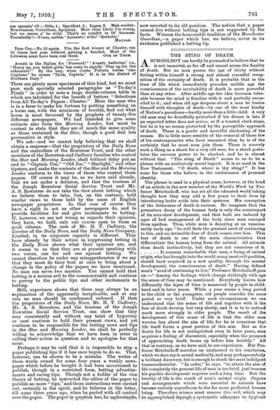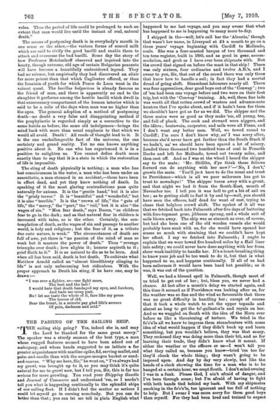THE STING OF DEATH.
IISCHOOLBOY can hardly be persuaded to believe that he is not immortal, so far off and unreal seems the finality of death. But no man passes the age of thirty without feeling within himself a strong and almost resentful recog- nition of the certainty of death. It is probable that in the time of life which immediately precedes middle age the consciousness of the inevitability of death is more powerful than at any other. After middle age the idea becomes toler- able because the mind is familiar With it and partially recon- ciled to it ; and when old age deepens about a man he busies himself with thoughts of death—by one of the most kindly of Nature's paradoxes—hardly more than a little child. A very old man may be dreadfully perturbed if his dinner is late, if an expected letter does not arrive, or if a trusted clock stops, but he is by no means perturbed by the perceptible approach of death. There is a gentle and merciful slackening of the senses. He is little more sensible of the removal of those few of his contemporaries who have remained than he is of the certainty that he must soon join them. There is scarcely such a thing as a shock for a very old man, for a shook postu- lates the nervous power to be shocked, and he is almost without that. "The sting of Death" seems to us to be a phrase with an exclusively moral import. It is so used in the New Testament. " 0 death, where is thy sting P " It has none for those who believe in the continuance of personal identity.
The phrase is used in a physical sense, however, at the head of an article in the new number of the World's Work by Pro- fessor Metchnikoff, who has set all the educated world taking thought how they may add a few years to their lives by introducing lactic acids into their systems. His conception of the bitterness of death is curious. He imagines that the premature decay of the human body is only the counterpart of its over-slow development, and that both are induced by ages of bad management of the body since man emerged from apedom. Thus, while man is decaying at an unneces- sarily early age, "he still feels the greatest need of continuing to live, and an invincible fear of death comes over him. This fear of death is one of the main characteristics that differentiate the human being from the animal. All animals shun death instinctively, but they are not conscious of it.
It remains remarkable that man, a being of animal origin, who has brought into the world. many moat evil qualities, should have acquired as a new quality, through his mental development, the consciousness of death." Having defined man's "need of continuing to live," Professor Metchnikoff goes on :—" Among the feelings which change strikingly with age the sense of time may be mentioned. Everybody knows how differently the lapse of time is measured by people in child- hood and in later years. While a year seems a long period to the child or the youngster, old people consider the same period as very brief. Under such circumstances we can understand that the sense of life and together with it the fear of death develop but very slowly, and it is to be noticed much more strongly in older people. The result of the development of this sense of life is that the older man worries less about the aim of life, for he is conscious that life itself forms a great portion of this aim. But as the desire for life is not extinguished even in later years, man
acquires a feeling of discontent, especially when the prospect of approaching death looms up before him terribly." All
that is contrary, as we have said, to our experience. But Pro.
fessor Metchnikoff marches on unalarmed to his conclusion, which we dare say is sound medically, and may perhaps embody a brilliant discovery, but is enough to shock the most indulgent
transcendentalist. "In order," he says, "to attain the aim of life completely the present life of man is too brief, just because
his psychic development requires such a long time. But the brevity of life is the result of man's animal origin. Organs and arrangements which were essential to animals have become entirely superfluous to the far more perfected human being. Therefore science must remove this evil, which may
over the paper. The paper in question has, he understands, be atonplished through a systematic adherence to hygienic
rules. Thus the period of life could be prolonged to such an extent that man would live until the instant of real, natural death."
The means of postponing death is in everybody's month in one sense or the other,—the various forms of soured milk which are said to vivify the good bacilli and enable them to attack and overcome the bad bacilli. Some day the story of how Professor Metchnikoff observed and inquired into the hearty, though extreme, old age of certain Bulgarian peasants will have become a beautifully embroidered legend. They had no science, but empirically they had discovered an elixir far more potent than that which Cagliostro offered, or than the fountain of youth for which Ponce de Leon went in the vainest quest. The bacillus bulgaricus is already famous as the friend of man, and there is apparently no end to the slaughter it performs among the hostile bacilli which dwell in that unnecessary compartment of the human interior which is said to be a relic of the days when man was no higher than the apes. The general adoption of a method of postponing death—no doubt a very false and disappointing method if the prophylactic is regarded simply as a corrective to the same habits as before, the same old indulgences—brings the mind back with more than usual emphasis to that which we would all avoid. Death ! All roads of thought lead to it. It is the one unchallengeable fact of the universe, the one certainty and grand reality. Yet no one knows anything positive about it. No one who has experienced it is in a position to enlighten us. You cannot define death more exactly than to say that it is a state in which the restoration of life is impossible.
The sting of death physically is nothing; a man who has lost consciousness in the water, a man who has been under an anaesthetic, a man stunned in an accident,—these have been in effect dead, and yet they know nothing of death. In speaking of it the most glaring contradictions pass quite naturally for axioms. It is the " gentle hand," but it is also the "grisly terror." It is " beautiful " and "wonderful," but it is also " terrible." It is the " crown of life," the " gate of life," the " mercy," the " port," the " veil," but it is also " the wages of sin." " Men fear death," says Bacon, " as children fear to go in the dark ; and as that natural fear in children is increased with tales, so is the other. Certainly, the con-
templation of death, as the wages of sin and passage to another world, is holy and religions ; but the fear of it, as a tribute
due unto nature, is weak." The circumstances of death are full of awe, yet there is "no passion of the mind of man so weak but it masters the power of death." Thus " revenge triumphs over death ; love slights it ; honour aspireth to it ; grief flieth to it." It is as natural to die as to be born. And when all has been said, death is but death. To cultivate what Matthew Arnold called an " almost bloodthirsty clinging to life" is not only unbecoming but ridiculous. With the proper approach to Death his sting, if he have one, may be drawn:— " I was ever a fighter, so—one fight more, The best and the last !
I would hate that death bandaged my eyes, and forebore, And bade me creep past.
No ! let me taste the whole of it, fare like my peers
The heroes of old, Bear the brunt, in a minute pay glad life's arrears Of pain, darkness and cold."











































 Previous page
Previous page